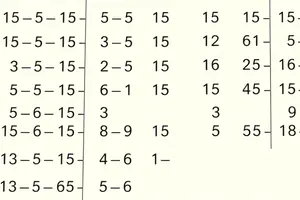Podcast
Questions and Answers
Which statement accurately describes the primary advantage of using general aptitude tests in the hiring process?
Which statement accurately describes the primary advantage of using general aptitude tests in the hiring process?
- They offer a standardized and objective measure of skills, reducing bias. (correct)
- They provide a subjective assessment based on the interviewer's personal feelings.
- They exclusively evaluate a candidate's personality traits, ensuring cultural fit.
- They focus solely on past job performance rather than potential.
A job candidate is given a series of questions that require them to quickly identify errors in alphanumeric codes. Which type of aptitude test is being administered?
A job candidate is given a series of questions that require them to quickly identify errors in alphanumeric codes. Which type of aptitude test is being administered?
- Spatial Reasoning
- Verbal Reasoning
- Data Checking (correct)
- Numerical Reasoning
In what way do aptitude tests and personality tests differ?
In what way do aptitude tests and personality tests differ?
- Aptitude tests assess personality traits; personality tests measure cognitive skills.
- Aptitude tests are subjective; personality tests are objective.
- Aptitude tests measure current skills; personality tests measure potential to learn.
- Aptitude tests predict job performance; personality tests assess job fit and team compatibility. (correct)
If a candidate is asked to mentally manipulate 3D objects, which aptitude test would be used?
If a candidate is asked to mentally manipulate 3D objects, which aptitude test would be used?
Which of the following steps would be MOST helpful when preparing for an aptitude test?
Which of the following steps would be MOST helpful when preparing for an aptitude test?
A company wants to assess candidates for roles requiring innovation and creative thinking. Which aptitude test is MOST suitable for this purpose?
A company wants to assess candidates for roles requiring innovation and creative thinking. Which aptitude test is MOST suitable for this purpose?
What is a key difference between aptitude tests and skills tests?
What is a key difference between aptitude tests and skills tests?
Which task would be part of a numerical reasoning test?
Which task would be part of a numerical reasoning test?
What is the purpose of assessing logical reasoning in an aptitude test?
What is the purpose of assessing logical reasoning in an aptitude test?
In what scenario would a mechanical reasoning test be most useful?
In what scenario would a mechanical reasoning test be most useful?
What is a limitation of relying solely on aptitude tests for hiring?
What is a limitation of relying solely on aptitude tests for hiring?
A candidate is asked to identify the underlying assumption in a written argument. Which aptitude is being assessed?
A candidate is asked to identify the underlying assumption in a written argument. Which aptitude is being assessed?
Which of the following describes how aptitude tests are typically scored?
Which of the following describes how aptitude tests are typically scored?
Why might a company use an adaptive aptitude test?
Why might a company use an adaptive aptitude test?
Which role would benefit MOST from a candidate's proficiency in error checking?
Which role would benefit MOST from a candidate's proficiency in error checking?
What does an aptitude test measure?
What does an aptitude test measure?
Which assessment method is considered more objective and standardized than interviews alone?
Which assessment method is considered more objective and standardized than interviews alone?
If an aptitude test's percentile ranking indicates relative performance, what does this entail?
If an aptitude test's percentile ranking indicates relative performance, what does this entail?
Which action can help minimize the impact of test anxiety on aptitude test performance?
Which action can help minimize the impact of test anxiety on aptitude test performance?
What type of errors are examined during an error-checking aptitude test?
What type of errors are examined during an error-checking aptitude test?
Flashcards
General Aptitude Tests
General Aptitude Tests
Assessments used to evaluate a candidate's skills and potential to perform job-related tasks, measuring abilities like numerical, verbal, logical, and spatial reasoning.
Numerical Reasoning
Numerical Reasoning
The ability to understand and analyze numerical data, interpret graphs and tables, perform calculations, and solve mathematical problems.
Verbal Reasoning
Verbal Reasoning
The ability to understand and analyze written information, including reading comprehension, identifying logical fallacies, and drawing inferences.
Logical Reasoning
Logical Reasoning
Signup and view all the flashcards
Spatial Reasoning
Spatial Reasoning
Signup and view all the flashcards
Abstract Reasoning
Abstract Reasoning
Signup and view all the flashcards
Mechanical Reasoning
Mechanical Reasoning
Signup and view all the flashcards
Data Checking
Data Checking
Signup and view all the flashcards
Error Checking
Error Checking
Signup and view all the flashcards
Multiple-Choice Questions
Multiple-Choice Questions
Signup and view all the flashcards
Norm-Referenced Scoring
Norm-Referenced Scoring
Signup and view all the flashcards
Aptitude Tests
Aptitude Tests
Signup and view all the flashcards
Personality Tests
Personality Tests
Signup and view all the flashcards
Aptitude Tests
Aptitude Tests
Signup and view all the flashcards
Skills Tests
Skills Tests
Signup and view all the flashcards
Study Notes
- General aptitude tests are pre-employment assessments used to evaluate a candidate's skills and potential to perform job-related tasks
- These tests measure a range of abilities, including numerical reasoning, verbal reasoning, logical reasoning, and spatial reasoning
Purpose of General Aptitude Tests
- To assess a candidate's cognitive abilities and predict their job performance
- To identify individuals with the potential to learn and adapt to new roles
- To provide a standardized and objective measure of skills, reducing bias in hiring decisions
- To streamline the hiring process by quickly identifying qualified candidates
- To ensure a good fit between the candidate's skills and the job requirements
Types of Aptitude Tests
Numerical Reasoning
- Assesses the ability to understand and analyze numerical data
- Questions may involve interpreting graphs and tables, performing calculations, and solving mathematical problems
- Often used for finance, accounting, and data analysis roles
- Example: Calculating percentages, ratios, and statistical measures
Verbal Reasoning
- Measures the ability to understand and analyze written information
- Questions may involve reading comprehension, identifying logical fallacies, and drawing inferences
- Important for roles requiring strong communication and critical thinking skills
- Example: Identifying the main idea of a passage or understanding complex arguments
Logical Reasoning
- Evaluates the ability to identify patterns, draw logical conclusions, and solve problems
- Questions may involve deductive reasoning, inductive reasoning, and critical thinking
- Useful for roles that require problem-solving and decision-making skills
- Example: Identifying patterns in a sequence or solving logic puzzles
Spatial Reasoning
- Assesses the ability to visualize and manipulate objects in space
- Questions may involve mental rotation, spatial visualization, and understanding geometric shapes
- Important for roles in engineering, architecture, and design
- Example: Assembling 3D shapes or understanding spatial relationships
Abstract Reasoning
- Measures the ability to identify patterns and relationships in abstract shapes and figures
- Questions do not rely on verbal or numerical skills
- Assesses fluid intelligence and problem-solving skills
- Useful for roles that require creative thinking and innovation
- Example: Identifying the next figure in a sequence or completing a pattern
Mechanical Reasoning
- Assesses the understanding of mechanical principles and physical laws
- Questions may involve levers, pulleys, gears, and other mechanical devices
- Important for roles in engineering, maintenance, and skilled trades
- Example: Understanding how levers work or identifying the forces acting on a mechanical system
Data Checking
- Evaluates the ability to quickly and accurately compare and verify data
- Questions may involve identifying errors in alphanumeric codes or numerical data
- Useful for roles that require attention to detail and accuracy
- Example: Spotting errors in large datasets or verifying invoice details
Error Checking
- Similar to data checking, but focuses on identifying errors in written text or documents
- Questions may involve grammar, spelling, punctuation, and formatting errors
- Important for roles that require strong written communication skills
- Example: Proofreading documents or identifying errors in reports
Format of Aptitude Tests
- Typically multiple-choice questions with a time limit
- May be administered online or in a paper-based format
- Can be adaptive, adjusting difficulty based on performance
- Often include practice questions to familiarize candidates with the format
How to Prepare for Aptitude Tests
- Practice with sample questions and tests
- Focus on improving speed and accuracy
- Understand the types of questions and the skills they assess
- Get enough rest and manage stress before the test
- Familiarize yourself with the test format and instructions
- Consider taking practice tests under timed conditions
- Review basic math, grammar, and logic concepts
Benefits of Using Aptitude Tests
- More objective and standardized than interviews alone
- Helps identify candidates with the right skills and potential
- Reduces the risk of biased hiring decisions
- Improves the efficiency of the hiring process
- Provides valuable insights into a candidate's strengths and weaknesses
Limitations of Aptitude Tests
- May not fully capture all aspects of job performance
- Can be influenced by test anxiety and cultural background
- Should be used in conjunction with other assessment methods
- Require careful selection and validation to ensure relevance
How Aptitude Tests are Scored
- Usually scored based on the number of correct answers
- May be norm-referenced, comparing scores to a reference group
- Some tests use percentile rankings to indicate relative performance
- Cutoff scores may be used to screen candidates
- Scoring algorithms vary depending on the test provider
Aptitude Tests vs. Personality Tests
- Aptitude tests measure cognitive abilities and skills
- Personality tests assess personality traits and behavioral styles
- Aptitude tests are used to predict job performance
- Personality tests are used to assess job fit and team compatibility
- Both types of tests can be valuable in the hiring process
Aptitude Tests vs. Skills Tests
- Aptitude tests measure potential to learn and develop skills
- Skills tests measure current proficiency in specific tasks
- Aptitude tests are used to identify candidates with the capacity to succeed
- Skills tests are used to verify that candidates have the necessary skills
- The two types of tests complement each other in the hiring process
Studying That Suits You
Use AI to generate personalized quizzes and flashcards to suit your learning preferences.




